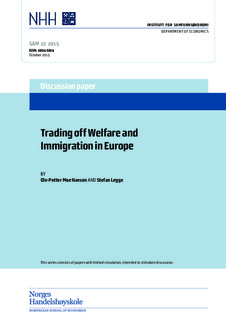| dc.description.abstract | In this paper, we explore the trade-off Europe faces when choosing between immigration
from poor countries and welfare spending. Using data from the European
Social Survey on sixteen countries from 2002{2012, we document that voter preferences
shifted in favor of redistribution but polarized over low-skill immigration. Notably,
there is a sharp increase in the share of individuals supporting the welfare state but
heavily opposing immigration. In order to provide an economic explanation for these
phenomena, we present a model where support for both immigration and redistributive
policies are potentially motivated by altruism. Using this model, we show how rising
unemployment rates, shares of foreign-born citizens and aggregate education can explain
observed shifts in policy preferences. | nb_NO |
